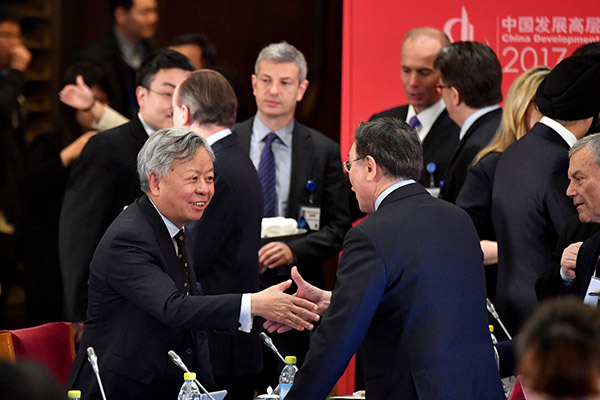AIIB head sees globalization as benefit to all
 |
|
Asian Infrastructure Investment Bank (AIIB) President Jin Liqun (L) speaks with a guest during the China Development Forum (CDF) 2017 in Beijing, March 19, 2017. [Photo/Xinhua] |
The head of the Asian Infrastructure Investment Bank voiced support on Monday for globalization, saying that countries can benefit from the process with effective domestic reforms and correct policy choices.
AIIB President Jin Liqun warned that globalization has suffered a setback because of the lack of shared benefits and the polarization of the world's haves and have-nots.
"There is an urgent need to improve global economic governance. This is going to bring about shared benefits and ensure that no country is left behind," Jin said in a speech at the China Development Forum in Beijing. The three-day event ended on Monday.
The AIIB chief said that globalization has enabled many countries to adopt "pro-market measures" and achieve "huge gains" in economic efficiency and prosperity.
"I think we are all winners of globalization. ... I absolutely deny that there are losers," he said, adding that countries that are not doing well in the process need to "fix" their policies to benefit from globalization.
Jin's comments were seen as the latest evidence of China's effort to defend globalization and call for greater policy coordination among governments to foster growth and support free and fair trade.
At their G20 meeting in Germany over the weekend, financial ministers and central bank governors did not mention anti-protectionism or their traditionally strong support for free trade in their statement, which disappointed some observers.
"It is a clear example that the world is losing the support for globalization," said Stephen Roach, a senior fellow at Yale University's Jackson Institute for Global Affairs.
Roach lauded China's call for greater coordination among countries, saying that globalization is not about one country leading or dominating but rather about commitment from a large number of countries.
He said governments should build much more broad-based, responsive and long-term safety nets to fund programs that deal with the costs of globalization.
"I don't think there are any winners (in the trend of anti-globalization). The only winners are the politicians who get power from the backlash," he added.
Lou Jiwei, chairman of the National Council for Social Security Fund and former finance minister, also expressed disappointment with the G20's failure to mention anti-protectionism in the meeting statement.
"Anti-globalization measures cannot stop the trend of globalization. It will only reduce the benefit of the people and undermine the fiscal basis to improve income distribution," Lou told the participants at the China Development Forum.
Paul Romer, chief economist and senior vice-president of the World Bank, said there is no reason to be pessimistic about China's economic prospects amid rising trade protectionism and economic nationalism, since the country survived the shock of the global financial crisis in 2008.
Romer added that China and the United States should try to manage their bilateral economic relations well and keep the consensus in favor of free trade, which he said is in the interest of both sides.
















